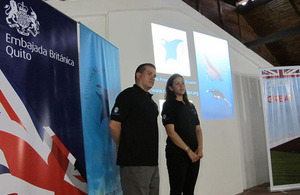World’s leading expert on manta rays gives conference supported by British Embassy
On 27 August, Dr Andrea Marshall, the world’s leading expert on manta rays, gave a talk to members of the media, government, civil society and local communities.

Mantas Ecuador
Dr Andrea Marshall, the world’s leading expert on manta rays, gave a conference about the importance of the conservation of this species. Some members of the media also had the chance to swim with Giant Mantas on 28 August. This was organised by ‘Proyecto Mantas Ecuador’ and sponsored by the Embassy. According to Dr Andrea Marshall, Isla de la Plata, a small island off the coast of Manabi province, should be known as the Giant Manta Ray capital of the world. This place has, in the season from June to September, the largest aggregation of this species in the entire world. More than 1000 manta rays have been identified here in just four years. Other projects elsewhere in the world, some going on for up to three decades, have not surpassed 350.
Ecuador has led efforts by several international bodies like CITES and CMS to protect Manta Rays, and they are protected by national laws. However, this species is threatened by lack of conservation policies elsewhere in the world – they are a migratory species – and also by a huge demand of a medical product made with Manta Ray gills, the efficiency of which has not been proven, which is sold primarily in Chinese markets. Dr Marshall explained that this is a highly unsustainable practice. Additionally, the revenues generated by this practice are insignificant compared to what Manta Rays mean in terms of tourism.
Through scientific investigation, the aim of ‘Proyecto Mantas Ecuador’ is to raise awareness among public institutions, local communities and the general public on the importance of preserving the species and therefore providing a sustainable livelihood for communities living near them. The British Embassy has supported this initiative for three years.